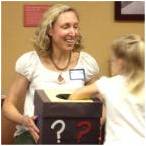“This is the first time the AAP has called out literacy promotion as being an essential component of primary care pediatric practice. Fewer than half of children are being read to every day by their families, and that number hasn’t really changed since 2003. It’s a public health message to parents of all income groups, that this early shared reading is both fun and rewarding.”
Archives For early reading
My friend asked how to entertain her young children on a 6000-mile road trip. I responded, “Play audio books for your whole family. You can download them into your smart phone or tablet for your child to listen to with headphones.”
On road trips with my daughter, here are our top three audio books we have enjoyed as a family:
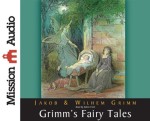 Grimm’s Fairy Tales are dark and entertaining. Each tale focuses on a moral that lends itself to further discussion and deeper learning. For example, was it fair that the king banished the maid for trying to steal the identity of the princess?
Grimm’s Fairy Tales are dark and entertaining. Each tale focuses on a moral that lends itself to further discussion and deeper learning. For example, was it fair that the king banished the maid for trying to steal the identity of the princess?
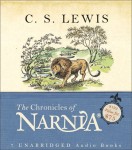 The Chronicles of Narnia collection by C.S. Lewis includes all of the stories about the mythical Narnia, including The Lion, The Witch and The Wardrobe and Prince Caspian. Miles fly by as these classic adventures unfold. I am always sad when these stories are over – but then I remember that I can listen again to return to where I have been.
The Chronicles of Narnia collection by C.S. Lewis includes all of the stories about the mythical Narnia, including The Lion, The Witch and The Wardrobe and Prince Caspian. Miles fly by as these classic adventures unfold. I am always sad when these stories are over – but then I remember that I can listen again to return to where I have been.
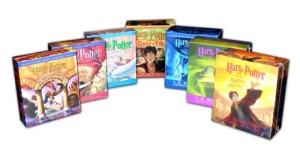 The Harry Potter books are entertaining and addictive. Time passes quickly while listening to this wonderful series and when book one is over, don’t be sad. You have six more.
The Harry Potter books are entertaining and addictive. Time passes quickly while listening to this wonderful series and when book one is over, don’t be sad. You have six more.
What are some of your favorite audio books to listen to on long trips?
I was reading aloud with one of my students the other day and thought, “I need to write about this.” Even my elementary age students and daughter have books that they love to hear read aloud. Here are my top-five picks that your elementary-age child will love to hear:
 First, Charlie and the Chocolate Factory by Roald Dahl is a favorite for its imaginative nature and elements of surprise. Dahl’s characters are funny and of course what child does not want to imagine sampling tasty treats in a chocolate factory. Even if your kiddos have seen the movie, all of you will enjoy the innuendos missing from the movie when you read aloud the book.
First, Charlie and the Chocolate Factory by Roald Dahl is a favorite for its imaginative nature and elements of surprise. Dahl’s characters are funny and of course what child does not want to imagine sampling tasty treats in a chocolate factory. Even if your kiddos have seen the movie, all of you will enjoy the innuendos missing from the movie when you read aloud the book.
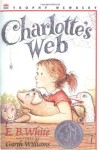 My kids love hearing Charlotte’s Web by E.B. White for many reasons. First, it is about animals – a relationship between a pig and a spider. But what intrigues them most is the friendship between these two unlikely creatures and how their friendship helps them to both grow on the inside and outside.
My kids love hearing Charlotte’s Web by E.B. White for many reasons. First, it is about animals – a relationship between a pig and a spider. But what intrigues them most is the friendship between these two unlikely creatures and how their friendship helps them to both grow on the inside and outside.
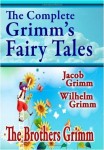 The stories in Grimm’s Fairy Tales have a bit of a dark side to them but that is what the kids enjoy most. For example, “the ash maiden” – essentially what the modern day Cinderella story is based on- has a darker ending than Disney portrays. For example in this story, the birds poke out the eyes of the stepsisters for their cruel and evil ways. A great set of tales that teach moral lessons.
The stories in Grimm’s Fairy Tales have a bit of a dark side to them but that is what the kids enjoy most. For example, “the ash maiden” – essentially what the modern day Cinderella story is based on- has a darker ending than Disney portrays. For example in this story, the birds poke out the eyes of the stepsisters for their cruel and evil ways. A great set of tales that teach moral lessons.
For more about reading fairy tales aloud, read Einstein on Fairy Tales and Education by Maria Popova.
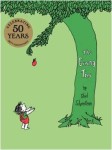 The Giving Tree by Shel Silverstein is short but great to read aloud. The book is poetic. So when you read it aloud, you and your child will feel the words. In the story, a tree loves a boy and gives to him until there is nothing physically left to give. It is a story of how love grows and evolves over time.
The Giving Tree by Shel Silverstein is short but great to read aloud. The book is poetic. So when you read it aloud, you and your child will feel the words. In the story, a tree loves a boy and gives to him until there is nothing physically left to give. It is a story of how love grows and evolves over time.
 Finally, The Secret Garden by Frances Hodgson Burnett is appropriate for your older child (second grade and older) due to its length (331 pages). An orphaned girl is forced to live on her Uncle’s estate where she discovers a secret garden. It is a story of her emotional growth as she transforms the garden into a thing of beauty and discovers some deep hidden secrets along the way. Time will fly as your imagination takes you to the mysterious, magical garden.
Finally, The Secret Garden by Frances Hodgson Burnett is appropriate for your older child (second grade and older) due to its length (331 pages). An orphaned girl is forced to live on her Uncle’s estate where she discovers a secret garden. It is a story of her emotional growth as she transforms the garden into a thing of beauty and discovers some deep hidden secrets along the way. Time will fly as your imagination takes you to the mysterious, magical garden.
These are my top five favorite books to read aloud to elementary-age kids.
What are some of your kid’s favorite books to have read aloud?
If you want your children to be intelligent, read them fairy tales. If you want them to be very intelligent, read them more fairy tales.
Many parents ask me what are some of my favorite reading programs for use in their unschool or home school programs.
Because I work with children age four to eleven and from different backgrounds, English language learners for example, I rely on materials from three exceptional programs. These three programs offer the flexibility and range that accommodates the different abilities of my students. Any of these programs would be excellent additions to your unschooler or homeschooler program.
First, the Wilson reading system is very phonetically structure. It breaks down the rules and structures of reading in a way that makes them easily taught. The materials include phonetically controlled stories and sentences, and workbooks to support the rules used and learned. This program is great for second graders and adults alike. It offers training for parents and teachers. I found the training helpful but not essential to using the materials which are very self-explanatory.
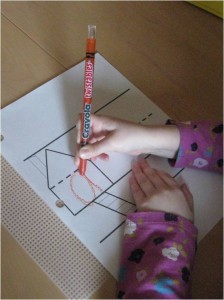 Second, the Orton-Gillingham approach to teaching reading is very multisensory and follows a sequence in teaching letter sounds so kids can start reading words after learning just four letter sounds. It focuses on a lot of tactile learning using sand trays and grids with paper and crayons to allow kids to feel how to form the letters or remember how to spell sight words.
Second, the Orton-Gillingham approach to teaching reading is very multisensory and follows a sequence in teaching letter sounds so kids can start reading words after learning just four letter sounds. It focuses on a lot of tactile learning using sand trays and grids with paper and crayons to allow kids to feel how to form the letters or remember how to spell sight words.
Third, Explode the Code by Nancy Hall is an excellent series of workbooks that helps support the Wilson reading and Orton-Gillingham programs. They are designed for preschoolers and elementary age children. However, you can adapt these materials for struggling older readers or English language learners.
These are my top three reading approaches/programs that will easily complement our roadmap2reading apps.
What are some reading programs you recommend or have found useful in working with your kids?
The summer is a great time to learn how to help your child become a better reader. Three books offer great insights to help foster your child’s inherent desire to read:
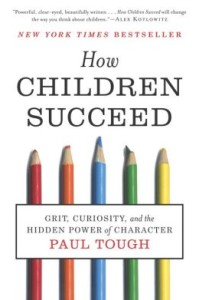 What does it take to succeed against difficult odds? In How Children Succeed, Paul Tough focuses on real life stories from teachers working with children that have grit and character – the ability to achieve in tough situations confounded by poverty and parental neglect. By sharing these stories and current brain research, this book serves as a touchstone for teaching your child how to learn from failure and turn it into achievement. It emphasizes the powerful importance of your role as parent and teacher in nurturing character – and ultimately your child’s success
What does it take to succeed against difficult odds? In How Children Succeed, Paul Tough focuses on real life stories from teachers working with children that have grit and character – the ability to achieve in tough situations confounded by poverty and parental neglect. By sharing these stories and current brain research, this book serves as a touchstone for teaching your child how to learn from failure and turn it into achievement. It emphasizes the powerful importance of your role as parent and teacher in nurturing character – and ultimately your child’s success
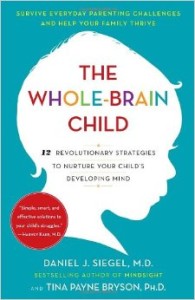 How do you nurture your child’s developing mind? The Whole-Brain Child by Daniel Siegel offers 12 strategies that emphasize teaching brain integration – helping your child interpret her behavior better so that she can connect her emotions to her experiences. Seigel offers you a plan for helping develop your child’s thinking brain – so that she becomes skilled at using words to explain feelings. This book puts you in a great position to teach your child skills that will foster and develop emotional intelligence that is essential to having a full and successful life.
How do you nurture your child’s developing mind? The Whole-Brain Child by Daniel Siegel offers 12 strategies that emphasize teaching brain integration – helping your child interpret her behavior better so that she can connect her emotions to her experiences. Seigel offers you a plan for helping develop your child’s thinking brain – so that she becomes skilled at using words to explain feelings. This book puts you in a great position to teach your child skills that will foster and develop emotional intelligence that is essential to having a full and successful life.
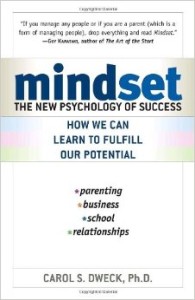 Mindset: The New Psychology of Success by Stanford University psychologist Carol Dweck emphasizes the importance of having a growth mindset. Through her research and experience, Dweck defines a person with a growth mindset as one who takes on challenges and views them as growth opportunities. For example, a child with a growth mindset will view failing a spelling test as opportunity to study harder next time to make a better grade. This book gives great ideas that you can use to help your child succeed by fostering a sense that not succeeding is not the end, but instead an opportunity to work hard to achieve to success. Additionally, Dweck offers great insights into the danger of praise and positive labeling with our children. According to Dweck, parents should focus praise on effort, “Wow! You got an A on your test. You must have studied hard!” …not on ability, “Wow! You got an A on your test. You’re so talented!”
Mindset: The New Psychology of Success by Stanford University psychologist Carol Dweck emphasizes the importance of having a growth mindset. Through her research and experience, Dweck defines a person with a growth mindset as one who takes on challenges and views them as growth opportunities. For example, a child with a growth mindset will view failing a spelling test as opportunity to study harder next time to make a better grade. This book gives great ideas that you can use to help your child succeed by fostering a sense that not succeeding is not the end, but instead an opportunity to work hard to achieve to success. Additionally, Dweck offers great insights into the danger of praise and positive labeling with our children. According to Dweck, parents should focus praise on effort, “Wow! You got an A on your test. You must have studied hard!” …not on ability, “Wow! You got an A on your test. You’re so talented!”
These three books have inspired me as a parent and teacher.
What are some books you can recommend for parents and teachers to read this summer?
Click here to see my more in depth review of The Whole Brain Child
Click here to see my more in depth review of Mindset
Click here for my blog about the importance of grit and character
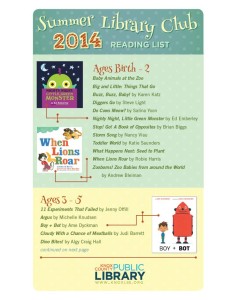 Over the summer, it is easy to get into summer mode and forget to keep up reading practice. Here are a few fun ways to keep up your child’s practice so that reading skills will be remembered when school begins:
Over the summer, it is easy to get into summer mode and forget to keep up reading practice. Here are a few fun ways to keep up your child’s practice so that reading skills will be remembered when school begins:
1.) With extra time in your child’s summer schedule, make regular visits to your library. Have your child join the reading challenges many public libraries offer — to read a number of books for a reward. Many public libraries offer lists of books appropriate for your child’s age and developmental stage. Make your library visits a fun way to explore different types of books and book genres.
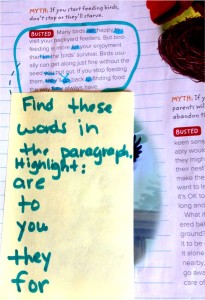 2.) Use children’s magazines like Highlights to create opportunities for your child to find specific words in articles. (Please click here to read my review of magazines for your child.) In your chosen magazine, make a list of word that your child is learning. Ask your child to find and highlight all of the listed words in a paragraph that you have circled. Your child can use all kinds of different colored highlighters to make searching for the words more fun. This is a great way to help your child practice their sight words like “is” and “was” or word families like “hat” and “mat”. Finding words that rhyme is another great variation on this word search game – for example, finding calf and laugh in an article or circled paragraph about a farm girl and her animals.
2.) Use children’s magazines like Highlights to create opportunities for your child to find specific words in articles. (Please click here to read my review of magazines for your child.) In your chosen magazine, make a list of word that your child is learning. Ask your child to find and highlight all of the listed words in a paragraph that you have circled. Your child can use all kinds of different colored highlighters to make searching for the words more fun. This is a great way to help your child practice their sight words like “is” and “was” or word families like “hat” and “mat”. Finding words that rhyme is another great variation on this word search game – for example, finding calf and laugh in an article or circled paragraph about a farm girl and her animals.
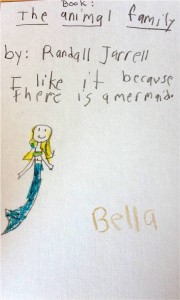 3.) Help your child start a book club. Have your child write down the titles of favorite books on note cards and then a short sentence about what he or she liked about each book. For example, “It had a cat and dog in the story.” Your child can illustrate the sentence on the note card as well. Then have your child share the cards with her friends. At play dates with friends, they can exchange cards to suggest books to read. This is a great way for friends to share their excitement for well-loved books.
3.) Help your child start a book club. Have your child write down the titles of favorite books on note cards and then a short sentence about what he or she liked about each book. For example, “It had a cat and dog in the story.” Your child can illustrate the sentence on the note card as well. Then have your child share the cards with her friends. At play dates with friends, they can exchange cards to suggest books to read. This is a great way for friends to share their excitement for well-loved books.
Here are three fun ways to keep your child’s reading on track for the summer.
What are ways you help keep your child practicing his reading throughout the summer?
 Many people ask me, “Why is it important for my child to be reading at an early age?” One reply is:
Many people ask me, “Why is it important for my child to be reading at an early age?” One reply is:
- Your early reader can become more confident and successful. School is more academic. Gone are half days or naptime in kindergarten. Our children are expected to be ready to read when starting kindergarten.
- Children without reading skills are left behind quickly. Children who come to kindergarten with a strong reading foundation or who are already reading independently can keep pace. They have a wider range of vocabulary and ideas. As a result, they tend to be confident and secure about their abilities in school. This leads to greater enjoyment and overall motivation within the classroom environment.
When I track the kids I have taught and my daughter’s progress, I see success continue throughout their school experiences. Children who are successful in school go on to take that success through their lives and help to make the world a better place.
How has early reading helped your child or a child you know?
Click here to read your early reader’s first advantage: Motivated by Choice
Click here to read your early reader’s second advantage: Advanced Knowledge
First publish October 2013.
 Many people ask me, “Why is it important for my child to be reading at an early age?” One answer is:
Many people ask me, “Why is it important for my child to be reading at an early age?” One answer is:
- Your early reader may develop interests and expertise in subject areas by reading advanced texts independently – sooner than children who start reading in kindergarten.
- My daughter is a nonfiction buff – particularly in the area of animals. Because she started reading at two, she was able to read advanced texts by age four. This allowed her to read deeply about topics that interested her: for example squirrels, owls, frogs…and of course, princesses and fairies.
- Advanced vocabulary skills made learning complicated texts much easier for my daughter. As a result, in elementary school she excels in the areas of science and social studies due to her backlog of knowledge.
- In a nutshell, that expertise “effect” can make your early reader very motivated to read and take in as much information as possible.
Reading early is a great way for your child to build vocabulary. Vocabulary and advanced knowledge will provide your child with an advantage when he or she starts school.
How has early reading helped your child or a child you know?
Click here to read your early reader’s first advantage: Motivated by Choice
First publish October 2013.
 Many people ask me, “Why is it important for my child to be reading at an early age?” One answer is:
Many people ask me, “Why is it important for my child to be reading at an early age?” One answer is:
- Choice will motivate your early readers. Reading opens the world of choices.
- Yes, reading to your child is a great way to start. Even before reading independently, your child can choose what she wants you to read to her. When your child starts to read independently, she can choose to ask you about words. As her reading proficiency increases, your child may begin to choose what she wants to read to learn more – such as learning about African Dwarf frogs or the planets of our solar system.
- These experiences will give your child the advantage of knowing how to learn about subjects you may have never thought to teach – motivating her to want to learn more by reading more.
- Having early choices can motivate your child. This motivation can carry forward throughout their school experiences.
How has early reading helped your child or a child you know?
First publish October 2013.






